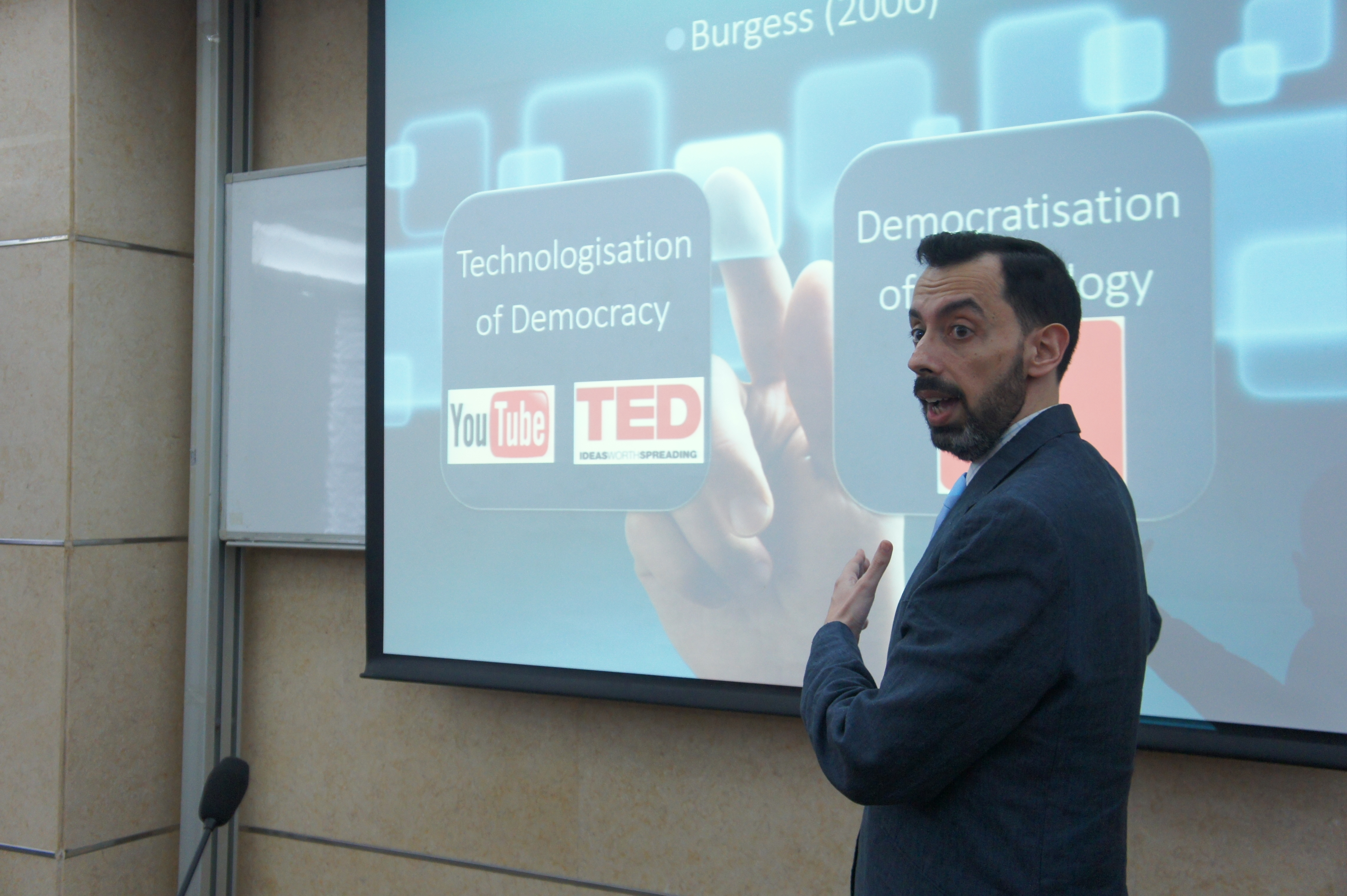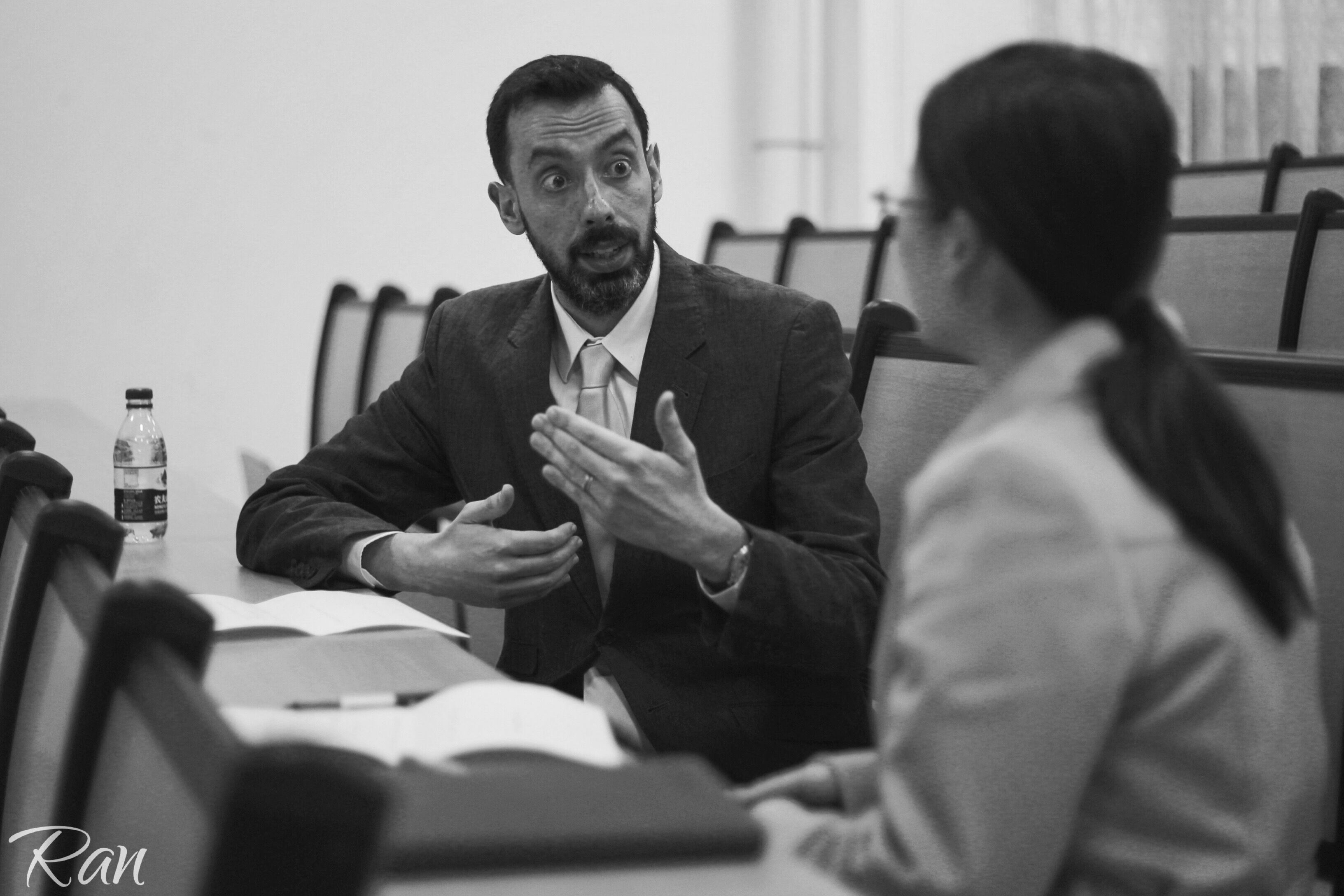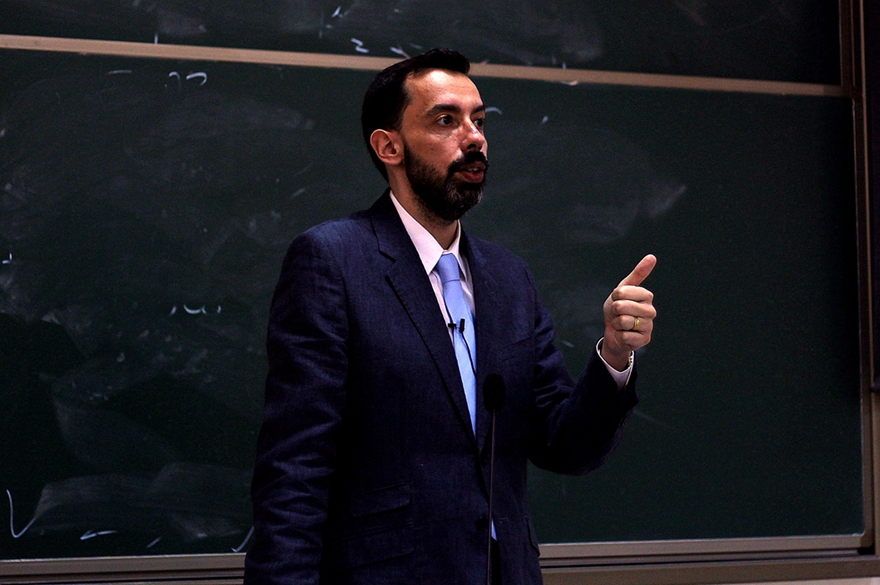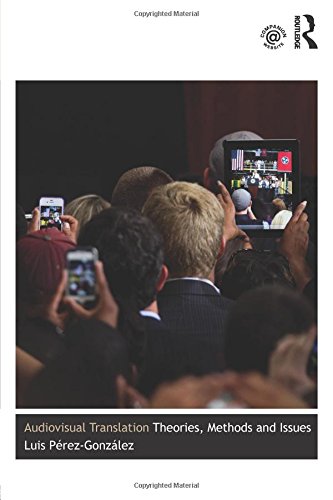Distinguished expert in audiovisual translation, editor and consultant of several international journals including The Interpreter and Translator Trainer (ITT), Dr. Luis Perez-Gonzalez from the University of Manchester has brought an intellectual feast of seven lectures to our University, and shared with GDUFS News his translation experience, his passion and perspective of the subject, and his suggestions to translation learners. (The interview is conducted in QA form.)

Dr. Luis Perez-Gonzalez during the interview
Q1: Hello, Professor González, could you share with us your personal experience in translation and interpreting studies?
A1: When I went to university, I did that traditional language degree, I studied English language and literature, and culture studies, and at the time my degree did not include any translation studies at all. Then I became a postgraduate student in the U.K., and my interest at the time was in linguistics. In fact, my MA dissertation and even my PhD thesis has nothing to do with translation; they were on forensic linguistics, which is using linguistic analysis to help either police investigations or resolutions to jurisdictional disputes, and so on.
Soon after I started working on my PhD thesis – because I needed to supplement my income – I became a professional translator (financial and audiovisual translation) for different firms and multilateral institutions (European Parliament, European Commission, World Trade Organization, Organization for the Harmonization of the Internal Market, Inter-American Investment Corporation) and I kept on practising translation for many years until 2004. During my practice, I realized this is something that interests me a lot, and suddenly there was this new job opportunity, and so I became a translation tutor at the university. This is how I started my academic work. Something that started as a professional activity then became an object of study as part of my career.

Dr. Luis Perez-Gonzalez giving a lecture
Q2: Based on your previous study in forensic linguistics and professional practice in organizations such as the EU and WTO, I assumed you would choose professions or research fields associated with legal translation. Why did you choose media translation?
A2: After a while, it became very clear that, if i wanted to develop my academic work, I wasn’t going to able to translate professionally. I suppose I kept what interests me: translation, but I moved away from what I was doing, which was a practicing professional. And now as an academic, I am more focused on what interests me more at the intellectual level.
Essentially, media is taking over everything. Before, we had only written text, but now written text has become the minority, as most text combines many types of semiotics: they have become audiovisual texts which combine images, sounds, and so on. That is something interests me as a translator: I need to go beyond what the words say, and I need to think about what meaning people are trying to convey through other means which go beyond written language: like the voice people have, the camera perspective, and so on.
Still it’s about mediating between cultures and mediating between languages. I am not so interested in these professional, highly-organized settings, like the WTO. I am more interested in ordinary lives in which we have all these forms of media influencing how we interact with people, how we organize our lives, the way we try to influence others’ behavior and also to shape others’ expectations.

Dr. Luis Perez-Gonzalez giving a lecture
Q3: How would you picture the future of media translation studies?
A3: I don’t think you can picture the future of media translation studies if you don’t think about it in relation to the future of media studies, so removing the translation bit, OK? (OK.)
I think what is happening at the moment is that the cultural and media industry is going through a profound crisis. Because of social and technological transformation, we find ourselves in a situation where society does not consider journalism and translation as activities that require a specific kind of expertise. So many people feel empowered to become citizen journalists or translators – even though their linguistic skills are not very good – and use that to participate in public discussions through social media and other technological platforms. This is very important for us professionals because it challenges our professional status, and we need to find ways to understand that phenomenon, so we can explain to society why what we do is important, and why what we do has to be recognized through remuneration – that is basically through money.
What is happening to media translation is not that different to media in general. We are going through a process of DE-profitization and amatuerization, and what used to be the main drivers like objectivity, accuracy and fidelity in which we present our information, are no longer the main priorities for some of the people who consume information or consume translation. This is because what they want is a different approach that foregrounds more what the translator and the user of the translation had in common aspects of affinity between both groups.
And the same thing is going to happen in journalism. I recently attended a talk given by a member of BBC R&D team; what they are working on is a program which will act like an internet browser which can detect your behavior patterns, so depending on your visits, the BBC knows your preferences and tastes of TV programs. When you go on the internet and watch the news, the BBC would automatically show you the bit of news that interests you.
This is what I mean when I say we are looking for ways to narrow the gaps between the content and the user of the content. I used the term “presumer” to describe it like the mixture of producer and consumer. They are meeting in the middle and that is what is causing the crisis in the media and creative industries, so it is very interesting to see what this may lead to in the future.

Dr. Luis Perez-Gonzalez during the interview
Q4: What would you consider to be the frontier of media translation?
A4: That is very difficult to answer. What I would say is that audiovisual translation, which was born in the 1920s, used to follow a very strict convention set by mostly the Hollywood industry. Subtitling is done more or less the same way, in terms of spacial restrictions, temporal restrictions, and we want subtitles in synch with the dialogue. The same things happened with dubbing.
This convention has been around for a while: about a century. And now for the first time, we have people who are able to do audiovisual translation without having to follow the requirements of the industry. The way they are doing it is very innovative. I’ve showed examples in my presentations of how subtitles are created in different ways. These emergent modes of engaged subtitling agency are, in many cases, part of a movement of cultural resistance against global capitalist structures and institutions through interventionist forms of subtitling, whether for aesthetic or political reasons. And I also referred to the Chinese practice of watching the film with comments moving through the screen---it shows us the screen, which only used to communicate what the character said in another language; now it is a space where people relate to one other, to develop forms of social interaction, and that is why it is so interesting.

Dr. Luis Perez-Gonzalez giving a lecture

Dr. Luis Perez-Gonzalez's new book: Audiovisual Translation: Theories, Methods and Issues (2014, Routledge)
Q5: In your previous session “Writing for and Publishing in International Journals: an editor’s perspective”, you identified some ways of thinking about writing up research and examined what one needs to do in order to prepare and submit work for publication in international translation and interpreting studies journals.
(video link: http://newmedia.gdufs.edu.cn/index.php?s=/Home/Article/detail/id/9055.html)
During your time as editor, what kind of articles would attract your attention?
A5: The editing I was in charge of was on The Interpreter and Translator Trainer (ITT). That journal had a very specific remit, so within it you can’t make the kind of choices your question implies. But I’ve also been involved in many other editorial projects, and essentially what interests me are works which try to go beyond the comparison between the languages. It’s not that it is not necessary or interesting, but just a lot of them have been done already.
I don’t find articles essentially about comparing what the source language and the target language say, with the view normally to highlight the translation errors and to criticize the choice made by the translators, particularly interesting. I am more interested in looking at how translation can become the main drive for social practice. I am more interested in works which show me the influence translation has had in certain social and political events.
I am now supervising doctoral projects that might give you an indication of the kind of things that interest me. For example, I am researching on fan-subbing groups which clearly want to impact the society by introducing content that would normally not been used. I am also supervising research on the translation of the Koran, the sacred book of Islam, so how choices were made about: how the Koran is bonded, the color and typography is used, the use of prefaces by the translator. What we call the para-text, things that goes around the text to the extent of influencing the reception of the work. I have another student working on eye-tracking, so she wants to establish whether those who watch subtitle programs in another language can understand irony in the same way as those who were watching the program in the original language. I have students working with Wikipedia and the extent of translation is driving the growth of wiki and turning it into one of the most used resources in digital culture. We can discuss translation as a culture phenomenon, a social-political phenomenon and an economical phenomenon.
Q6: Do you have any suggestions for translation learners?
Dr. Luis Perez-Gonzalez sharing suggestions to translation learners
A6: I think that my main recommendation for translation students is for them to be very aware of their capacity to influence social-economic developments and other aesthetic and creative events around them. One of the things that tend to happen is that a translation student tends to fixate on linguistic problems and culture hurdles that one is presented with in dealing with texts. So we tend to worry so much about translation being accurate that we don’t even understand the significance of the text that we are dealing with, we don’t think too much about the implication that some of the choices we make may have on the way the translated texts are received.
My main recommendation is you need to be very aware that you are an individual, that you are fully trained to be an individual with the capacity to make informed decisions about how a text should communicate to a different audience. And that you should be able to always use the right degree of latitude and discretion to achieve that to the best of your ability and make a success of the communicative encounter that you are trying to mediate, so you need to think of yourself as somebody who is a fully ratified participant in the communicative event.
Introduction of Dr. Luis Perez-Gonzalez:
http://www.manchester.ac.uk/research/luis.perez-gonzalez/personaldetails
Academia.edu profile: http://manchester.academia.edu/LuisPerezGonzalez
UoM Research profile: http://www.manchester.ac.uk/research/luis.perez-gonzalez/
Twitter: http://twitter.com/LuisPerezGonz11
Centre for Translation and Intercultural Studies: http://www.alc.manchester.ac.uk/ctis
Introduction of the lectures:
1.“Audiovisual Translation in the Digital Media Ecology”
2.“Multimodal Theories in Translation and Interpreting Studies”
3.“Exploring the Interface between Translation Studies and Citizen Media”
4.“Translation, Journalism and New(s) Media”
5.“Writing for and Publishing in International Journals: an editor’s perspective”
6.“ Research Methods for the Study of Media Translation”
7.Workshop on Media Cultural and Translation Studies

